Photographs: Reuters. Arghya Ganguly
Little Shankar is not in a playful mood. His playful habit - leaping up to kiss the cheek of his playmate, Laila the cow - is too arduous.
Having exhausted his daily share of four tumblers of water 20 hours ago, his throat is dry and legs weak.
Laila, thirsty herself, prods Shankar with her nose. But he sits in the parched yard outside his house, unresponsive to Laila's prodding.
Water scarcity stalls life and makes people languid in Sangli's Jath taluka. It is noon at Walsan village, and the government's water tanker, which was to arrive at nine in the morning, has not turned up yet.
...
Drought: It's a fight for survival in Maharastra
Photographs: Reuters.
The tractor apparently ran out of fuel on the way. The people are too downcast to protest. Step into any of Jath's 123 villages and you will find the same theme of water scarcity, arid landscape, wilting plants and half-dead farmers.
Sangli is one of the 15 Maharashtra districts to be declared drought-affected this April. It falls in the rain shadow of the Western Ghats. This is the area's fourth drought since 2000. Last year it rained here on only four days.
Falling groundwater, lack of irrigation channels and government apathy are cited as reasons for the plight of farmers. With close to zero returns from their land, 60 per cent of Jath's population is believed to have moved to places like Nagpur, Wardha, Ratnagiri and Mumbai in search of work, says a <I>panchayat</I> member.
...
Drought: It's a fight for survival in Maharastra
Photographs: Reuters.
Many work in sugarcane factories. "I haven't seen some families in the <I>taluka</I> for eight to 10 months," he says.
"They have locked up their houses, taken whatever they could and gone to the city. They know their children are missing school, but survival is their primary objective."
"According to the stars, it was supposed to rain a month ago, but it didn't," says Babu Yashwant Khandekar, a farmer. "We have no hope from the rest of the monsoon season. It looks like it's going to be a repeat of last year."
...
Drought: It's a fight for survival in Maharastra
Photographs: Reuters.
To prevent that, the parents of Dombale, a teenager, gave him up as an offering to the rain gods last week.
The boy can be seen drifting dully through the village. Girls have been told to pay him no attention. He goes from house to house begging for food, his eyes downcast so that he does not look into a girl's face.
Village elders state that although the heads of families like Dombale's declare that they do this for the good of the community, to usher in the rains, in reality they do it because they can no longer afford to support the child.
...
Drought: It's a fight for survival in Maharastra
Photographs: Reuters.
When the tanker finally arrives at one in the afternoon, chaos ensues. Men and women set to elbowing and jabbing, each to place his or her plastic water containers ahead of others.
The 6,000-litre tank comes twice a day to a few villages. Each house is allowed to fill only two vessels at a time.
People try to flout the rule and squeeze in an extra vessel. But a member of the Panchayat Samiti of Jath overseeing the operation voices his displeasure in rich invective.
...
Drought: It's a fight for survival in Maharastra
Photographs: Reuters.
Unable to bear the thirst, Shankar scoops water from the pot but gets a whack on his head from his mother. She goes inside her hut and ladles the water into separate vessels for drinking, washing and cooking.
Some farmers sacrifice their share to quench the thirst of their livestock. "We can still survive a few days on meagre food and water, but not them," says one farmer.
A few years ago the villagers used to pour some portion of the water from the tanker into their wells for storage, until they realised the bone-dry well was devouring most of the water.
...
Drought: It's a fight for survival in Maharastra
Photographs: Reuters.
Away from the commotion around the water tanker, Sanjay Tile is working his field.
With a pair of green-horned, gaunt bullocks he drives the plough as hard as he can. He performs this ritual every year before the monsoon. He furrows and prays that it rains.
Only if it rains does he sow the seeds. More often than not, he has to exchange the unused seeds for food. In the six years since he took over the land from his father, Tile says he has mostly woken up to a cloudless sky.
...
Drought: It's a fight for survival in Maharastra
"I'm totally at the mercy of the rain for water," he says. "There is no other source of water." The borewell, which brought water to his field until a few years ago, has to be hand-pumped for at least half an hour before any water trickles from it.
Tile purchases fodder for his cattle from comparatively prosperous neighbouring <I>talukas.</I>
Due to the Maishal lift-irrigation water scheme project, Kavathe Mahankal and Miraj <I>taluka</I> of Sangli are relatively better off, although the eastern parts of both areas are still barren.
Tile can get free fodder in Magdal village if he wants, but for that he has to travel a long way. The Shiv Sena recently adopted Magdal village, and gives out free fodder on certain days of the week.
...
Drought: It's a fight for survival in Maharastra
Photographs: Reuters.
Magdal locals complain that it has been two weeks since government fodder, for which they pay, last arrived.
The Shiv Sena, they say, has provided the relief. About 1,000 cattle come together at a time to get fed. Not everybody can avail of such arrangements, thanks to the long journey to Magdal. Fed on insubstantial and unhealthy food, Tile's cattle cannot travel 60-70 km, even to cart back free fodder.
Last year, Tile grew a little jowar which, instead of selling, he stored to feed his family of five. This year, with no money in his pocket, Tile trudges along with other farmers everyday to work at a nearby sugarcane factory.
...
Drought: It's a fight for survival in Maharastra
Photographs: Reuters.
For his labour he earns Rs 5 a day, where the state's minimum wage for unskilled labour in food mills is Rs 150 and up (no minimum has yet been set for unskilled labour in a sugarcane mill).
"I buy daal with it. My wife dilutes the daal with water so that the five of us can eat more than once a day," says Tile.
The villagers are entitled to Rs 150 of ration once a month. Few can afford it. Approaching private lenders is the last resort. "If you take a loan from them they will ensure your life turns into a living hell," says Tile.
"They pester you from the next day itself to return the money, although they can see that it hasn't rained and our land hasn't yielded crops. If we have to borrow then we do it in small amounts. A few years back a farmer who took a large sum committed suicide under duress."
...
Drought: It's a fight for survival in Maharastra
Photographs: Reuters.
Lankappa Natekar, a member of the Jath Panchayat Samiti, says: "It has been a month since [Shiv Sena executive president] Uddhav Thackeray and the chief minister [Prithviraj Chavan] paid a visit and assured us that they will improve conditions, but as always nothing has been done. [Baramati MP and Union Agriculture Minister Sharad] Pawar hasn't bothered to visit and we are angry about it."
Many farmers, especially in the 45 Kannada-speaking villages of Jath, feel that they should join Karnataka. With the help of local political leaders, says Natekar, "we made a request to the Karnataka government to help us, and they responded in the affirmative. They have assured us water, free electricity and seeds. If all of us get together and protest that we want to be part of Karnataka and not Maharashtra then we believe the Maharashtra government will be bound to let us go."
...
Drought: It's a fight for survival in Maharastra
Photographs: Reuters.
The border is 30-40 km from Walsan. Locals say that had Jath MLA Prakash Shendge not been from the BJP, the Congress-led state government would have helped a long time ago.
The Maishal lift-irrigation water scheme, started in 1982 in Miraj <I>taluka</I>, reached Kavathe Mahankal <I>taluka</I> only seven months ago.
"The Maishal project would by now have reached Jath <I>taluka,</I> which is 40 km from Kavathe Mahankal, had Shendge been with the right party," says Vinayak Patole, a farmer in Kavathe Mahankal. Shendge, it is said, came to power on the basis of his support to Hindus during the Hindu-Muslim riots in Miraj in 2009.
...
Drought: It's a fight for survival in Maharastra
Photographs: Reuters.
The rumour is that within a month or two Shendge will shift to the Congress, and "we will see the start of the Maishal project in Jath".
"This is partially true," says Shendge. "When I had internal problems with my party six months ago the Congress showed interest in me because my father, Shivaji Rao Shendge, was with them. But I think that matter has cooled down now."
Shendge agrees that being in the ruling party is an advantage, but says he has done everything he could as a member of a non-ruling party.
"I made the chief minister and opposition leader come here to see the ground realities. I publicised the drought so much that it cannot escape anyone's notice or [the authorities] can't pretend not to know about it. About 15 days back, I even got Rs 19 crore cleared by the government to build 400 small cement dams."
...
Drought: It's a fight for survival in Maharastra
Photographs: Reuters.
Once in five years or so Sangli district gets rainfall, due to cyclonic winds coming across Andhra Pradesh.
Small dams costing Rs 5-6 lakh each are to be built to conserve this water. Each village will have five to six dams.
"You can't wholly blame the government for our state," states Shendge. "The chief minister has sanctioned 20 litres of water per day per person. He has allocated funds for it. If the water isn't reaching the people then it's a failure of the bureaucracy."
For the water to reach all of Sangli district, which is hilly terrain, the Maishal project water has to be lifted six times.
...
Drought: It's a fight for survival in Maharastra
Photographs: Reuters.
Till now the water has been lifted four times for it to reach Kavathe Mahankal. Shendge says Jath <I>taluka</I> can't afford to wait till the Maishal project is fully completed.
He has asked the government to release water to Jath although the canal construction, and in other cases the lining of the canal, is yet to be finished.
The government has accepted his supplication, and Chief Minister Chavan was in Jath on June 19 to release water.
But will this be enough for the outcast teenager Dombale to return home, and for Laila and Shankar to quench their thirst? The lack of water is holding the people of Jath down in more ways than one.

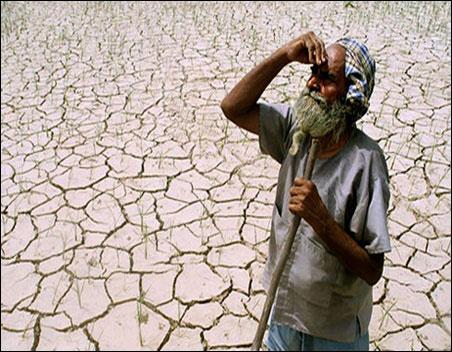
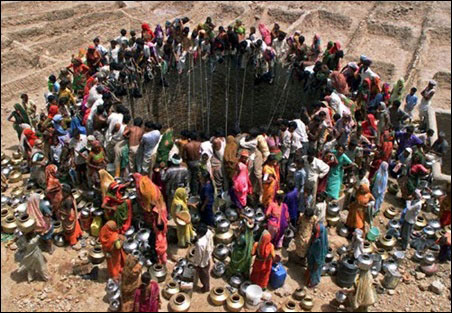
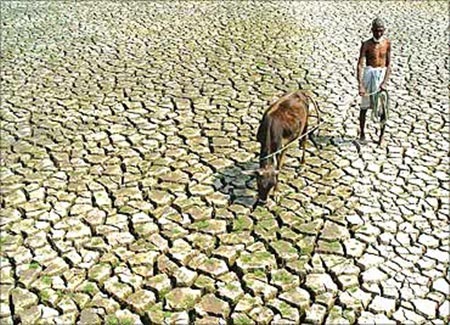

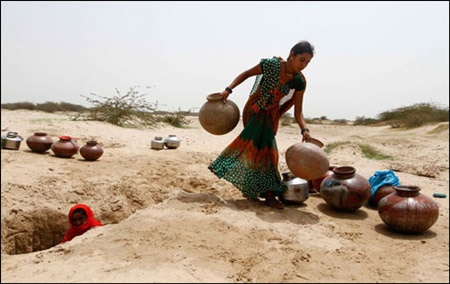
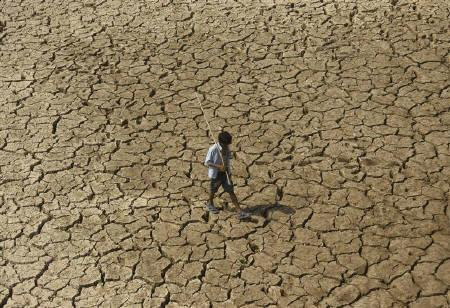
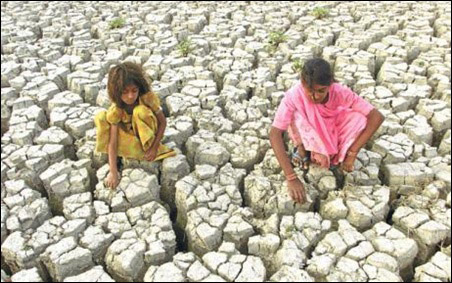
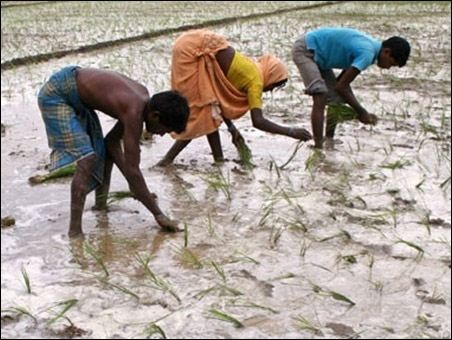
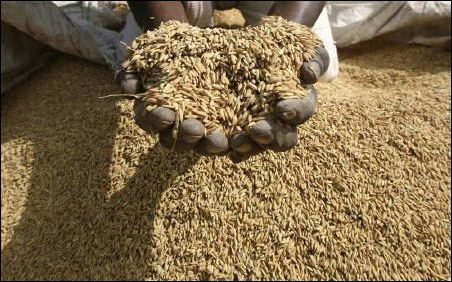

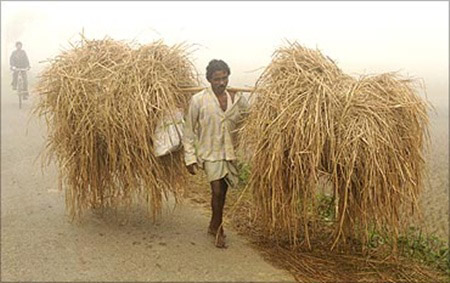
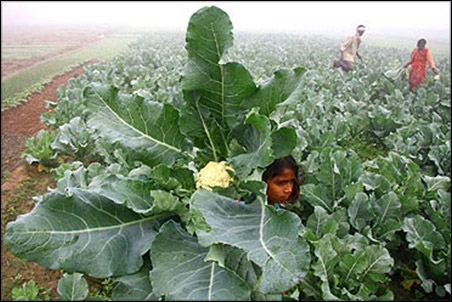
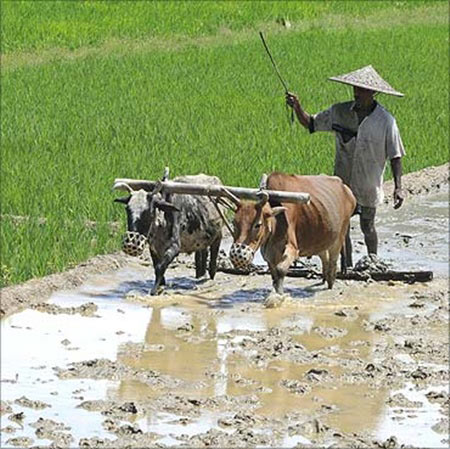
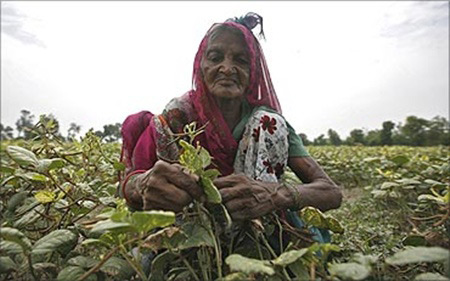


article